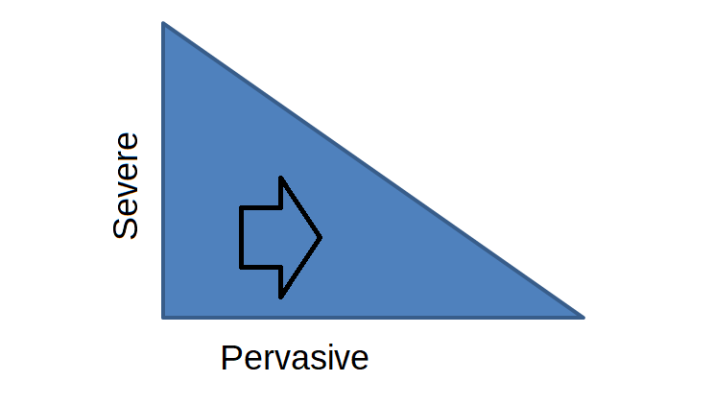Workplace harassment and discrimination present ongoing problems for Colorado employees. Federal and Colorado employment law, such as Title VII and the Colorado Anti-Discrimination Act, prohibit workplace harassment; however, employers continue to force employees to endure this harmful behavior.
Illegal harassment at work occurs when either: (1) enduring offensive behavior becomes a condition of continued employment; or (2) the offensive conduct is severe or pervasive such that it creates a hostile work environment. The offensive conduct must be attached to a prohibited motivation or act by the perpetrator. Workplace harassment lawyers represent employees in these claims against employers. If you believe you are the victim of harassing behavior then you should contact a workplace harassment lawyer in Colorado right away.
Although hostile work environment and other harassment claims may appear simple on the surface, the legal standards involved to prove a claim in a lawsuit are far more complex. Workplace harassment lawyers in Colorado understand the complicated rules around these lawsuits and how to pursue your claims against an employer that created a toxic work environment. Many courts around the country are not favorable grounds for employees pursuing employment law claims. Hire an advocate that understands the law and how to fight for you.
Table of Contents
- What is harassment at work in Colorado
- Who can be a workplace harasser
- What is offensive conduct in a hostile work environment claim
- What is a tangible employment action
- What is quid pro quo harassment
- What is a hostile work environment
- What kind of harassment is illegal
- Employer liability for harassment
- Remedies for workplace harassment in Colorado
- Colorado workplace harassment lawyers
What is considered harassment at work in Colorado
Colorado and federal employment law share basic standards for workplace harassment. Although standards are largely similar, harassment law can be complex because different standards apply depending upon key facts. This is why employees should talk to an employment lawyer right away. The attorney can help determine what steps the employee can and must take to preserve the job or a claim against the employer.
The definition of workplace harassment includes:
- The perpetrator is in a position related to the victim’s employment;
- The victim is an employee of the employer alleged to have harassed or allowed the employee to be harassed;
- The victim endured offensive behavior at work;
- Offensive to a reasonable person; and
- Offensive to the victim;
- The employee was either:
- Required to endure the offensive conduct as a condition of continued employment; or
- Was severe or pervasive such that it created an environment that is abusive (a hostile work environment) or results in an adverse employment action; and
- The offensive conduct was motivated by an illegal reason.
An employee pursuing a claim must prove each element of the claim to prevail against the employer. Within many of these elements are their own complicated rules. These rules created by federal and Colorado courts make it difficult for employees to prevail without the help of workplace harassment lawyers who understand them. Note that employment law surrounding harassment includes a large volume of rules. Not every standard or test applied in each possible combination of facts can be addressed in this space. Denver employment lawyers can help you navigate the legal standards to pursue your claims.
Who can be a harasser in a Colorado workplace?
Most employees in Denver and other parts of Colorado commonly believe a harasser at work is the employee’s supervisor; however, a potential harasser could share several other employment relationships to the victim employee. A supervisor has special power to use the power of his or her managerial authority to implement a tangible employment action against the employee. That is why people often associate workplace harassment with the conduct of a supervisor or manager.
Other people the employee comes into contact with via employment can also be harassers to a Colorado employee even if they lack the ability to fire, demote, or otherwise tangibly harm the employee’s job.
Management and Owners
Members of management certainly can be harassers even if they are not direct supervisors or in the management silo for the victim employee. They may feel emboldened by their power to over the employee to harass. Managerial or supervisory harassers can include:
- The employee’s direct supervisor;
- The direct supervisor’s supervisor;
- Any manager up the management chain;
- Another supervisor equal to the employee’s direct supervisor;
- Another member of management higher up the chain with no direct authority over the employee;
- The employer’s owners;
- Members of a Board of Directors;
- Interim managers; and
- Assistant managers.
Coworkers
Additionally, coworkers can be harassers with no management authority. Although these employees lack the authority to take action against the employee’s job they can participate in offensive conduct. They can include:
- Coworkers on the employee’s team;
- Employees of internal business partners or other departments;
- Employees who interact with the employee through email or phone only;
- Temporary employees and consultants; and
- Independent contractors hired by the employee.
Non-employees
Non-employees of the company can be harassers so long as the harassment takes place at work or through workplace channels. These may include:
- Customers and clients;
- Vendors that provide services or goods to the employer;
- External business partners; and
- Social guests of the employer allowed on the workplace property or to use workplace channels.
Employers often mistakenly believe they are not responsible for third party harassers. That is incorrect. If the offensive conduct occurs on company property or through company channels then the employer absolutely has the power to intervene and stop it.
The bottom line is that when workplace harassment occurs the employer may be liable when anybody within its authority or permitted to remain on its property. Employment lawyers in Colorado can help assess whether your employer is liable for the harasser’s toxic behavior. An employer’s liability changes based upon several factors in the specific situation. Some of these liability issues are addressed below.
What is offensive conduct in a workplace harassment claim?
A workplace harassment claim in Colorado requires the employee to suffer offensive conduct. The United States Supreme Court defines the offensive conduct as, “sufficiently severe or pervasive to alter the conditions of [the victim’s] employment and create an abusive working environment.” Meritor Sav’gs Bank v. Vinson, 477 U.S. 57, 67 (1986). This standard distinguishes between conduct that is offensive but slight from conduct that is abusive to the employee. Behavior that is childish or annoying is not offensive enough to create a workplace harassment claim. The line, however, is not always clear. This is a good reason why you should talk to a Denver employment lawyer if you believe you have experienced harassment at work.
Examples of conduct considered severe or pervasive include:
- discussing sexual activities;
- telling off-color jokes concerning race, sex, disability, or other protected bases;
- unnecessary touching;
- commenting on physical attributes;
- displaying sexually suggestive or racially insensitive pictures;
- using demeaning or inappropriate terms or epithets;
- using indecent gestures or crude language;
- sabotaging the victim’s work;
- engaging in hostile physical conduct.
Severe or pervasive offensive conduct
An important aspect of this standard is that the conduct is severe or pervasive. It does not have to be severe and pervasive (although it may be). It is an or standard. This matters at the extreme ends of severe or pervasive offensive conduct. Some harassment is severe but happens once or twice. Federal courts interpreting sex discrimination cases under Title VII agree that a single sexual assault is severe even if it only happens once. On the other hand, minor acts that would not by themselves create a strong claim for harassment can become pervasive the more often and the more frequently they occur. In many cases the offensive conduct is both severe and pervasive.
There is no magic number of harassing acts necessary to prove a workplace harassment claim in Colorado. Generally courts treat the severe or pervasive standard as a continuum. The more severe the conduct the fewer acts are necessary for an employee to meet his or her burden. The more pervasive the conduct the less severe the conduct must be.
Navigating the continuum to determine when employment law says, “enough is enough” requires a thorough understanding of the laws surrounding hostile work environments and other harassment claims. This is a good reason to talk to a Colorado employment lawyer as soon as you believe you have been harassed.

Objectively and Subjectively Offensive
The second part of determining whether conduct meets the standard for a claim is whether the severe or pervasive conduct is both objectively and subjectively offensive.
Conduct is subjectively offensive if it is offensive to the victim of the act. This is usually an easy burden for the employee to meet. If the conduct is not offensive to the employee then a harassment claim should not make it to the courthouse to begin with. It is rare that an employer can prove an employee really was not offended by the conduct.
Conduct is objectively offensive if it is offensive to a reasonable person in the community. Often this is where the judge or jury member decides whether he or she would find the conduct severe or pervasive that it created an abusive working relationship. There is no bright line rule for this test. It is up to the factfinder in a harassment lawsuit to weigh the facts. Reasonable minds differ. As a result the same facts may be held objectively offensive in one case and not in another.
Factors often considered include:
- the frequency of the unwelcome discriminatory conduct;
- the severity of the conduct;
- whether the conduct was physically threatening or humiliating, or a mere offensive utterance;
- whether the conduct unreasonably interfered with work performance;
- the effect on the employee’s psychological well-being; and
- whether the harasser was a superior within the organization.
The objective test in a workplace harassment lawsuit provides employers a check against hypersensitive employees and unethical employees manufacturing baseless claims. Without this test employers would have to sanitize every act and speech in the workplace to avoid harassment claims–both legitimate and illegitimate.
Tangible employment action or adverse employment action
A supervisor or other person with authority over the employee’s job may use that authority to harm the employee’s job as part of the harassment the employee suffers. Federal and Colorado employment law refer to this as a tangible employment action or adverse employment action. The use of the employer’s authority to harass an employee is certainly the type of offensive conduct employment laws intend to prohibit. As a result a tangible employment action is considered a severe form of offensive conduct in a workplace harassment claim.
These acts can include:
- Termination
- Demotion
- Pay cuts
- Transfers to less prestigious work assignments or work locations
- Negative performance reviews
- Cutting work hours
- Refusing otherwise earned raises or bonuses
- Interfering with an otherwise earned promotion or prestigious work assignments
Severity of a tangible employment action
Generally a tangible employment action requires a substantial impact on employment of the victim. Minor pay cuts, lateral transfers and other less substantial employer acts may make up part of the offensive conduct behind a hostile work environment but does not rise to the level of a tangible employment action as defined by the courts. The general exception to the general rule involves requests for sex acts as a condition of continued employment. Here the courts consider the request so severe that virtually any risk or promise involving the supervisor’s real or perceived authority results in a tangible employment action.
Workplace harassment claims involving an adverse, tangible employment action generally place greater liability on the employer because the employer’s authority over the employee’s job is directly implicated by the offensive conduct. Keep this in mind as we discuss the two common types of workplace harassment claims in Colorado.
What is quid pro quo harassment?
Quid pro quo harassment occurs when a supervisor leverages an offensive request in exchange for a workplace benefit. (Quid pro quo is Latin for “this for that.”) The classic example of quid pro quo harassment is sexual harassment in which a supervisor demands the subordinate employee perform a sex act to continue employment. (Perform X sex act or you are fired.) Quid pro quo harassment generally always involves a perpetrator in a supervisory role and a victim in a subordinate position.
In quid pro quo workplace harassment the supervisor uses his or her authority to force the subordinate to choose between submitting to a request or suffer a job detriment. This detriment is referred to as a tangible employment act. Without a tangible employment act (or the threat of a tangible employment act) the workplace harassment claim is analyzed like a hostile work environment claim. Tangible employment acts include:
- Threatening to fire the employee/requiring submission to maintain employment
- Threatening a demotion or pay cut
- Threats to reduce work responsibilities
- Threats to transfer the employee to a less prestigious or humiliating work location
- Implementing any of these threats because the employee refused
- Promising a promotion
- Promising a raise or bonus
- Promises of a more favorable job location
- Promising to assign favorable job duties
- Implementing a promised benefit because the employee complied
Quid pro quo sexual harassment
Sexual harassment is the most common form of quid pro quo harassment. Quid pro quo sexual harassment happens when a supervisor makes requests for sexual or romantic acts from a subordinate employee with the threat or promise of a tangible employment act.
A supervisor may sexually harass an employee without a quid pro quo request and create a hostile work environment; however, if the supervisor attaches a request for a sexual or romantic act tied to a tangible employment act then the employer is liable for quid pro quo sexual harassment. If you believe you experienced quid pro quo harassment at work then you should contact a Denver sexual harassment lawyer right away.
Quid pro quo religious harassment
A less common form of quid pro quo harassment involves religious acts. This is similar to sexual harassment in which the supervisor requests the employee perform or refrain from performing a religious act at the risk or promise of a tangible employment act. Examples of this form of workplace harassment include:
- Demanding an employee perform a religious act with other coworkers
- Requesting an employee attend a specific religious institution or service
- Requiring an employee to pray or read a religious text
- Demanding the employee not perform a religious activity at work
- Demanding the employee avoid a religious institution or service
These demands or requests must attach with a threat or promise of a tangible employment action to be a quid pro quo claim for workplace harassment.
What is a hostile work environment?
Hostile work environment claims happen when employers create or permit an abusive work condition. A hostile work environment under federal and Colorado employment law arises when offensive behavior alters the terms, conditions, or privilege of employment. There is no exact list of circumstances that creates a hostile work environment. Every claim is a fact-specific inquiry of:
- The events involved;
- Whether a reasonable person under the same set of circumstances would have found the conduct offensive;
- Whether the victim found the behavior offensive; and
- How the offensive behavior affected the employee.
A core question in a Colorado hostile work environment claim is how the behavior affected the employee. A hostile work environment claim does not require a tangible employment act or a discrete economic harm to the employee. It is enough that the employee experienced psychological harm as a result of the toxic environment.
An employee need not even quit a job to avoid the hostile work environment. The ultimate standard is whether the behavior explicitly or constructively altered the terms and conditions of employment. Burlington Indus., Inc. v. Ellerth, 524 U.S. 742, 752 (1998).
Although an employee need not suffer an explicit economic harm due to the hostile work environment, the measure of damages is often affected by the way the harassment affected the employee. It is easier for a jury to measure lost wages from a termination or demotion than psychological harm. If you believe a hostile work environment exists at work then you should contact Colorado workplace harassment lawyers to assess your situation.
What kind of workplace harassment is illegal in Colorado?
So far we have only addressed the mechanics of how offensive behavior rises to the level of a harassment claim; however, a critical element is what motivates the harassment. The only harassment claims an employee may pursue are those prohibited by law. If a statute or common law claim does not prohibit harassment then an employee is unable to pursue a valid claim for workplace harassment–no matter how disgusting the workplace behavior.
Employment discrimination and harassment
Federal and Colorado employment law prohibit employment discrimination on the basis of several protected traits and characteristics. These statutes, such as the Colorado Anti-Discrimination Act and Title VII of the Civil Rights Act of 1964, prohibit harassment on the basis of protected traits and statuses. These include:
- Race Discrimination
- Ethnicity Discrimination
- Sex Discrimination
- Gender Discrimination
- Pregnancy Discrimination
- Sexual Orientation Discrimination
- Age Discrimination
- National Origin Discrimination
- Religion Discrimination
- Disability Discrimination
Employers cannot create or permit to continue harassment because of a protected trait, status, or characteristic.
Ways employees may experience discriminatory harassment include:
- Comments, drawings, writings, and electronic images with disparaging messages or stereotypes;
- Ridiculing or humiliating treatment;
- Inappropriate jokes;
- Unwelcome sexual or romantic advances;
- Unwelcome, inappropriate, or injurious touching;
- Use of slurs;
- Requiring people to participate in religious activities;
- Including religious texts or articles in employee documents;
- Derogatory nicknames;
- Freezing the employee out from meetings and other workplace activities.
If you believe you suffered harassment on the basis of a protected right, characteristic, or trait then you should talk to a Denver employment lawyer right away. Employment discrimination laws and their claims are complex. Often multiple claims exist under these laws because multiple discriminatory acts often occur at the same time. It may be necessary for your employment lawyer to pursue several claims on your behalf. Employment discrimination claims generally require specific administrative processes; your employment lawyer will help navigate this process to a resolution or a lawsuit.
Retaliation and harassment
Federal and Colorado employment laws that prohibit retaliation also prohibit harassment as a form of retaliation. Like other prohibitions on harassment, these only apply where a statute or common law prohibit retaliation. Employers engaging in harassment as a form of retaliation is no different from taking a tangible employment action in retaliation. In Colorado employees receive protection from retaliatory harassment for:
- Complaining about unlawful forms of employment discrimination;
- Participating in an investigation or proceeding involving allegations of employment discrimination;
- Filing a complaint of discrimination with the EEOC or Colorado Department of Labor and Employment;
- Requesting or taking FMLA leave;
- Participating in union activities;
- Filing a claim for worker’s compensation;
- Whistleblowing on unethical, illegal, or dangerous conditions when reporting is protected by statute;
- Requesting unpaid wages, minimum wage, or overtime pay;
- Exercising employee rights protected by ERISA;
- Requesting a reasonable accommodation to a disability or religious belief;
- Participation as a servicemember in the armed forced; and
- Other statutory prohibitions on retaliation.
Retaliatory harassment may come in many of the same forms described above for discriminatory harassment. An employer may implement an adverse, tangible employment action as part of the harassment or simply allow the employee to suffer a hostile work environment. If you believe your employer retaliated with workplace harassment for exercising a statutory right then you should contact a Colorado workplace harassment lawyer right away.
Employer liability for harassment under federal and Colorado employment law
Employer liability for harassment in Colorado differs depending upon whether the harassment includes a tangible employment action and who perpetrates the offending conduct. Modern employment law generally views harassment claims through this lens rather than the traditional quid pro quo vs. hostile work environment claim. (A hostile work environment claim in Colorado may or may not include a tangible employment action.) That is because judicial opinions on employment discrimination and other harassment claims developed different liability burdens for employers on this basis. The existence of a tangible employment action indicates the employer’s direct participation in the harassment versus an indirect participation by allowing it to fester and continue.
Tangible employment action as part of the harassment
Generally if a tangible employment action forms part of the workplace harassment then the employer is strictly liable for the harassment. Strict liability is the highest liability burden in civil claims. Questions of motivation, mitigation, and other traditional defenses in employment law do not apply to strict liability claims. The employer may only defend that:
- The alleged harassment did not occur;
- No statute or common law claim prohibits the alleged acts;
- The employer did not take a tangible employment action; or
- The employer’s tangible employment action related to an unrelated reason from the alleged harassment.
Constructive discharge and the tangible employment action
A common issue in hostile work environment claims in Colorado is whether a constructive discharge is a tangible employment action. Constructive discharge occurs when the employee feels he or she has no choice but to quit due to the effects of a hostile work environment. The Supreme Court of the United States resolved disagreement over this issue in Pennsylvania State Police v. Suders. In Suders the Court ruled an employer is strictly liable for a constructive discharge as a tangible employment action if the hostile work environment was so intolerable that resignation was an appropriate response.
A hostile work environment satisfies this condition if it includes an “official act” by the employer of a serious nature. Examples commonly cited include:
- Demotion to a humiliating position (e.g. a demotion of several steps down the corporate ladder);
- An extreme pay cut; or
- A transfer to a position with unbearable work conditions.
Lesser supervisory act (unless quid pro quo sexual harassment is involved) generally do not meet this standard. Those acts can still be considered offensive behavior in a hostile work environment; however, they will not result in strict liability for the employer.
No tangible employment action within the harassment
If the employee does not suffer a tangible employment action as part of the harassment then the liability standard changes. Two liability standards apply depending upon who is the harasser.
Harassing supervisor
A harassing supervisor but does not take a tangible employment action can still result in liability for the employer; however the employer can raise an affirmative defense to the workplace harassment claim. An employer is vicariously liable for the acts of its supervisors; which means liability extends as though the employer as an entity acted through the supervisor. In 1998 the Supreme Court of the United States decided a pair of lawsuits in which it crafted an affirmative defense to non-tangible employment action supervisor harassment claims. Faragher v. Boca Raton, 524 U.S. 775 (1998), and Burlington Industries, Inc. v. Ellerth, 524 U.S. 742 (1998).
Faragher/Ellerth affirmative defense
The Faragher/Ellerth affirmative defense allows an employer to avoid liability if the employer can prove:
- The employer took reasonable action to prevent harassment and to promptly correct any harassing behavior; and
- The employee unreasonably failed to take advantage of any preventive or corrective opportunities provided by the employer or to avoid harm otherwise.
Generally employers prevail on the affirmative defense if they prove: (1) they established policies for employees to report harassment which result in investigation and corrective action; and (2) the employee failed to report harassment. If the employer prevails on the affirmative defense then it will not be liable.
The burden to prove the Faragher/Ellerth affirmative defense is on the employer and it is a fact specific defense. There are reasons why an employer’s policies may fail the affirmative defense or why an employee acted reasonably to not report. This often is the case when the harassing supervisor is high in the management chain or is directly involved in the reporting procedure. Generally employees should report harassment at an early stage; however, it is best to consult with Colorado employment lawyers about how to protect your job.
Non-supervisor harassment
If an individual in a non-supervisory capacity creates a hostile work environment then the employer’s liability is a negligence standard. An employer must act reasonably to prevent and correct harassment in the Colorado workplace. In non-supervisory harassment the employer must act diligently to correct harassment that it knows or should know about. In these cases the burden lies with the employee to prove:
- The employer’s knowledge of the harassment or why the employer reasonably should have known the harassment occurred; and
- The employer failed to take corrective action to stop the workplace harassment.
Practically, employers can deploy the same procedures used to prove the Faragher/Ellerth affirmative defense to combat an employee’s non-supervisor hostile work environment claim. This often requires an employee to follow the same procedures to report to prove the employer had actual knowledge. There are circumstances in which an employer may be liable without reporting; however, an employee’s claim is often helped by reporting. An employee experiencing a hostile work environment should consult with an employment lawyer as the harassing behavior begins.
Procedures and remedies in a workplace harassment claim in Colorado
Neither Colorado nor federal employment law include a general prohibition on workplace harassment; therefore each claim must follow the procedures and remedies available in the statute prohibiting harassment. The combination of employment laws covering harassment results in a web of procedures and possible remedies. Some laws, like Title VII and the ADA, require employees to file a charge of discrimination before a deadline to pursue claims. FMLA, on the other hand, allows the employee to file directly into court. Some laws have extremely brief periods in which the employee must act. Talk to a Colorado employment lawyer right away to make sure you follow the necessary processes.
Remedies can vary considerably, depending upon the damages available under the applicable statute. Some statutes, like employment discrimination statutes, provide a wide range of possible types of monetary awards. Others provide a narrow set of possible monetary relief. This is among the many reasons why determining which claims to bring can be extremely important.
Remedies for workplace harassment in Colorado may include:
- Lost wages–front pay and back pay;
- Restoration of lost benefits;
- Restoration of job or position;
- Out of pocket expenses;
- Mental anguish/emotional distress;
- Punitive damages or liquidated damages;
- Court costs; and
- Attorney’s fees.
Employment lawyers can help navigate the field of potential remedies based upon your situation.
Workplace harassment lawyers in Colorado
Workplace harassment lawyers in Denver and other parts of Colorado represent employees in harassment claims. Colorado employees should contact an employment law attorney about potential claims as soon as they believe there may be a problem. There are many reasons for this including:
- Reviewing whether the employee should make an internal complaint;
- The right way to satisfy the employer’s internal reporting procedure for a harassment complaint;
- What and when the employee should report to the Colorado employer;
- The employee’s next steps if a complaint fails to resolve the problem;
- How to watch out for retaliation for reporting;
- How and when to file an external complaint with an administrative agency or file a lawsuit;
- Represent the employee in an external complaint procedure or lawsuit; and
- Review whether other employment law claims like wrongful termination, discrimination and retaliation may apply.
Colorado workplace harassment lawyers are generally employment lawyers who represent employees, and sometimes employers, in harassment and other employment law issues. Visit this page to learn more about how a Colorado employment law attorney can help you.





